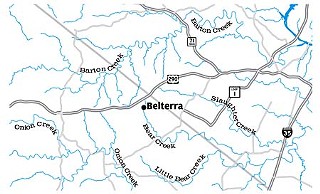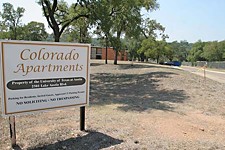TCEQ Paves the Way for Shit Creek(s)
State environmental agency rejects science in favor of allowing sewage in creeks
By Jacob Cottingham, Fri., Dec. 5, 2008

For a local example of the great "global warming debate," just look at the controversy over discharge of treated effluent – sewage in laymen's terms – in the Edwards Aquifer Watershed. On one side are the familiar government entities and environmental groups, such as the Barton Springs/Edwards Aquifer Conservation District, the city of Austin, Hays County, and the Save Our Springs Alliance. On the other are development interests and their lawyer, Andy Barrett, whose lobby list on file with the Texas Ethics Commission includes water giant Aqua America Inc. and an assortment of development and energy companies. Ostensibly in the middle are the commissioners of the Texas Commission on Environmental Quality – all appointed by industry-friendly Gov. Rick Perry. Each side has its own set of scientists, talking points, and convictions, making any environmental topic a lengthy point-counterpoint discussion.
There are three TCEQ-related issues in play, which seem to blend into a single case: One is the contested case of the Belterra development in Hays Co. This was a battle before two TCEQ administrative law judges, with each side arguing whether or not to discharge treated effluent from Belterra into Bear Creek, which feeds the recharge zone of the Edwards Aquifer. Following on its heels is the joint petition filed by the city of Austin and the BS/EACD, which asked the TCEQ for a change of rules to prohibit discharge into the Onion or Barton watersheds. A third TCEQ case on the horizon concerns Jeremiah Venture's massive residential development in Hays Co., which is seeking a permit to discharge effluent on thin soil covering the recharge zone.
On Nov. 19, city environmental officials learned the commission had denied the requested rules change (although commissioners moved to create a stakeholder committee to study the issue). Minutes later, the administrative judges in the Belterra case recommended permitting the development's discharge, albeit with certain conditions. TCEQ commissioners will have the final say. While the results may carry the whiff of a compromise, the protesting parties sounded roundly dejected by the rulings.
The decision on the rules change came as the biggest surprise. Council Member Lee Leffingwell had appeared before the TCEQ commissioners to speak in favor of the change, and he read a supporting letter from Hays Co. Commissioner Karen Ford. Additionally, the city of Dripping Springs, the BS/EACD, Travis County staff, and even the TCEQ's own administrative staff all advocated for the change in state rules. The primary reason for the change, explained city watershed expert Nancy McClintock, was the inevitable process of eutrophication – an excess of nutrients, such as phosphorus, that ends up in creeks, producing an increase of microorganisms and algae. Such an outcome would be disastrous for the Edwards Aquifer, as several creeks and streams within the Onion Creek and Barton Creek watersheds (specifically Onion, Bear, Little Bear, Slaughter, and Barton) feed the aquifer.
At the state hearing, attorney Barrett was the lone speaker in opposition to the rules change. Barrett, who also represents the Belterra developers, brought up "opposing science" but declined to get into specifics. Despite 95% of the municipalities in the affected watersheds supporting the rules change, and despite nearly two years' worth of data, modeling, and analysis in the Belterra case, commissioners sided with Barrett and voted down the change, with one commissioner suggesting the matter would best be addressed by the Legislature.
None of the commissioners opted to speak with the Chronicle to explain the commission's thinking on the ruling, but their legal counsel, Les Trobman, said they were concerned that not all the science was in agreement. Myron Hess of the National Wildlife Federation said the commissioners could have approved the rules change and tasked the newly created stakeholders committee with refining the language.
In a lengthy explanation to the Chronicle, Barrett essentially touched on three points: that there was no way a development the size of Belterra could adequately dispose of its wastewater without having to resort to some of it entering the stream; that even on the occasions where the stream would be flowing with effluent, such an outcome was better than letting it flow intermittently; and that the treatment of the effluent was of such a high quality that it would not trigger eutrophication. "Treating high-quality effluent and discharging a clean treated effluent into the creeks is beneficial," he said. "I believe that very strongly." Asked if there is any science that might convince him of the hazards of treated effluent in waterways, he said: "I'm sure there is. I can't think of it."
Barrett also reverted to a sort of moral relativism, saying that the creeks were hardly pristine and that people essentially didn't know how much effluent they were already coming into contact with. He pointed out, for example, that the city of Austin discharges effluent into the Colorado River. The Colorado, known locally as Lady Bird Lake and, to the west, Lake Austin, doesn't feed the aquifer, however.
Austin state Sen. Kirk Watson shared his thoughts on the commissioners' decision to look to the Legislature for guidance. "It is very common for TCEQ to defer or even abdicate its responsibility to take action on things by hiding behind this concept of, 'Well, we want to see what the Legislature tells us to do.'" he said. "There are other instances where I believe TCEQ had authority to take action to protect the health and safety of Texans, but they refused or failed to do so, because what they're doing is saying, 'We'll wait until somebody else tells us what to do.'" San Antonio Sen. Jeff Wentworth, whose district covers parts of Hays and Travis counties, offered a "no comment" on the TCEQ decision.
Adding to Watson's comments, Leffingwell told In Fact Daily, "I'm not optimistic that anything good is going to come out of the stakeholder process."
Interested parties can continue to watch the epic struggle over sewage, as SOS and the BS/EACD have filed for a contested case against Jeremiah Venture's permit application to spray effluent over a sensitive watershed zone. The city of Austin and other municipalities and organizations are expected to join that fight in the coming weeks.
Got something to say on the subject? Send a letter to the editor.










